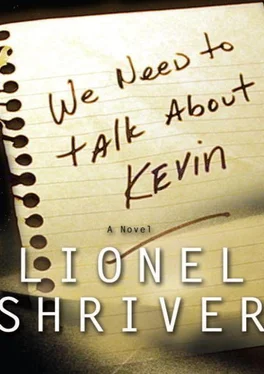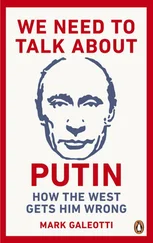“Hold on,” I said. “Didn’t he win some big academic prize last year?”
“Can’t say as I recall,” said Kevin blithely. “But that three-week suspension is going to nasty up his record something terrible. Ain’t that a shame? Geez, and you think you know people.”
“If everyone knew this search was coming,” I said, “why wouldn’t this Espinoza boy clear such an incriminating list from his locker beforehand?”
“Dunno,” said Kevin. “Guess he’s an amateur.”
I drummed my fingers on the coffee table. “These lockers. The kind I grew up with had slits in the top. Aeration vents. Do yours?”
“Sure,” he said, heading from the room. “So the French fries keep better.”
They suspended the valedictorian-in-waiting; they made Greer Ulanov pee her pants. They punished the poets, the hotheaded sportsmen, the morbidly dressed. Anyone with a jazzy nickname, an extravagant imagination, or the less than lavish social portfolio that might mark a student as an “outcast” became suspect. As far as I could tell, it was War on Weirdos.
But I identified with weirdos. In my own adolescence, I had strong, stormy Armenian features and so wasn’t considered pretty. I had a funny name. My brother was a quiet, dour nobody who’d scored me no social points as a predecessor. I had a shut-in mother who would never drive me anywhere or attend school functions, if her insistence on continuing to manufacture excuses was rather sweet; and I was a dreamer who fantasized endlessly about escape, not only from Racine but the entire United States. Dreamers don’t watch their backs. Were I a student at Gladstone High in 1998, I’d surely have written some shocking fantasy in sophomore English about putting my forlorn family out of its misery by blowing the sarcophagus of 112 Enderby Avenue to kingdom come, or in a civics project on “diversity” the gruesome detail in which I recounted the Armenian genocide would betray an unhealthy fascination with violence. Alternatively, I’d express an inadvisable sympathy with poor Jacob Davis sitting beside his gun with his head in his hands, or I’d tactlessly decry a Latin test as murderous —one way or another, I’d be out on my ear.
Kevin, though. Kevin wasn’t weird. Not so’s you notice. He did brandish the tiny-clothes thing, but he didn’t wear all black, and he didn’t skulk in a trench coat; “tiny clothes” were not on the official photocopied list of “warning signs.” His grades were straight Bs, and no one seemed to find this astonishing but me. I thought, this is a bright kid, grade inflation is rife, you’d think he’d make an A by accident . But no, Kevin applied his intelligence to keeping his head below the parapet. I think he overdid it, too. That is, his essays were so boring, so lifeless, and so monotonous as to border on deranged. You’d think someone would have noticed that those choppy, stultifying sentences (“Paul Revere rode a horse. He said that the British were coming. He said, ‘The British are coming. The British are coming.’”) were sticking two fingers up his teacher’s butt. But it was only when he wrote a paper contrived to repeatedly use the words snigger , niggardly , and Nigeria for his Black History teacher that he pushed his luck.
Socially, Kevin camouflaged himself with just enough “friends” so as not to appear, alarmingly, a loner. They were all mediocrities—exceptional mediocrities, if there is such a thing—or outright cretins like Lenny Pugh. They all pursued this minimalist approach to education, and they didn’t get into trouble. They may well have led a whole secret life behind this gray scrim of bovine obedience, but the one thing that didn’t raise a red flag at his high school was being suspiciously drab. The mask was perfect.
Did Kevin take drugs? I’ve never been sure. You agonized enough about how to approach the subject, whether to pursue the rectitudinous course and denounce all pharmaceuticals as the sure route to insanity and the gutter or to play the reformed hell-raiser and vaunt a long list of substances that you once devoured like candy until you learned the hard way that they could rot your teeth. (The truth—that we hadn’t cleaned out the medicine cabinet, but we’d both tried a variety of recreational drugs, and not only in the sixties but up to a year before he was born; that better living through chemistry had driven neither of us to an asylum or even to an emergency room; and that these gleeful carnival rides on the mental midway were far more the source of nostalgia than remorse—was unacceptable .) Each path had pitfalls. The former doomed you as a fuddy-duddy who’d no notion what he was talking about; the latter reeked of hypocrisy. I recall you finally charted some middle way and admitted to smoking dope, told him for the sake of consistency that it was okay if he wanted to “try it,” but to not get caught, and to please, please not tell anyone that you’d been anything but condemnatory about narcotics of any kind. Me, I bit my lip. Privately I believed that downing a few capsules of ecstasy could be the best thing that ever happened to that boy.
As for sex, the accuracy of that “hump ’em and dump ’em” boast is up for grabs. If I’ve claimed, of us two, to “know” Kevin the better, that is only to say that I know him for being opaque. I know that I don’t know him. It’s possible he’s still a virgin; I’m only sure of one thing. That is, if he has had sex, it’s been grim—short, pumping; shirt on. (For that matter, he could have been sodomizing Lenny Pugh. It’s uncannily easy to picture.) Hence Kevin may even have heeded your stern caution that if he ever felt ready for sex he should always use a condom, if only because a slimy rubber sheath bulging with milky come would have made his vacuous encounters that much more delectably sordid. I reason that nothing about a blindness to beauty necessitates a blindness to ugliness, for which Kevin long ago developed a taste. Presumably there are as many fine shades of the gross as the gorgeous, so that a mind full of blight wouldn’t preclude a certain refinement.
There was one more matter at the end of Kevin’s ninth-grade school year that I never bothered you about, but I’ll mention it in passing for the sake of being thorough.
I’m sure you would remember that in early June, AWAP’s computers were contaminated with a computer virus. Our technical staff traced it to an e-mail titled, cleverly, “WARNING: Deadly new virus in circulation.” No one seemed to trouble with hard-copy dumps or those chintzy little floppies anymore, so that since the virus also infected our backup drive, the results were disastrous. With file after file, access was denied, it didn’t exist, or it came up on screen all squares, squiggles, and tildes. Four different editions were put back for at least six months, encouraging scores of our most devoted bookstores, including the chains, to put in bountiful orders for The Rough Guide and The Lonely Planet when Wing and a Prayer couldn’t satisfy the brisk summer market with up-to-date listings. (We didn’t make any friends, either, when the virus sent itself to every e-mail address on our marketing list.) We never fully recouped the trade we lost that season, so the fact that I was forced to sell the company in 2000 for less than half its valuation two years earlier traces in some measure to this contagion. For me, it substantially contributed to 1998’s zeitgeist of siege.
I did not tell you about its source out of shame. I should never have been snooping, you’d say. I should have minded every parenting manual’s edict to respect the inviolability of a child’s bedroom. If I suffered dire consequences, I had made my own bed. It’s the oldest switcheroo in the book, and a favorite of the faithless the world over: When folks discover something incriminating by poking around where they’re not supposed to, you immediately flip the issue to the snooping itself, to distract from what they found.
Читать дальше












